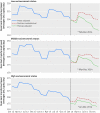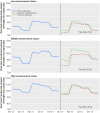Beverage purchases from stores in Mexico under the excise tax on sugar sweetened beverages: observational study
- PMID: 26738745
- PMCID: PMC4986313
- DOI: 10.1136/bmj.h6704
Beverage purchases from stores in Mexico under the excise tax on sugar sweetened beverages: observational study
Abstract
Study question: What has been the effect on purchases of beverages from stores in Mexico one year after implementation of the excise tax on sugar sweetened beverages?
Methods: In this observational study the authors used data on the purchase of beverages in Mexico from January 2012 to December 2014 from an unbalanced panel of 6253 households providing 205 112 observations in 53 cities with more than 50 000 inhabitants. To test whether the post-tax trend in purchases was significantly different from the pretax trend, the authors used a difference in difference fixed effects model, which adjusts for both macroeconomic variables that can affect the purchase of beverages over time, and pre-existing trends. The variables used in the analysis included demographic information on household composition (age and sex of household members) and socioeconomic status (low, middle, and high). The authors compared the predicted volumes (mL/capita/day) of taxed and untaxed beverages purchased in 2014-the observed post-tax period-with the estimated volumes that would have been purchased if the tax had not been implemented (counterfactual) based on pretax trends.
Study answer and limitations: Relative to the counterfactual in 2014, purchases of taxed beverages decreased by an average of 6% (-12 mL/capita/day), and decreased at an increasing rate up to a 12% decline by December 2014. All three socioeconomic groups reduced purchases of taxed beverages, but reductions were higher among the households of low socioeconomic status, averaging a 9% decline during 2014, and up to a 17% decrease by December 2014 compared with pretax trends. Purchases of untaxed beverages were 4% (36 mL/capita/day) higher than the counterfactual, mainly driven by an increase in purchases of bottled plain water.
What this study adds: The tax on sugar sweetened beverages was associated with reductions in purchases of taxed beverages and increases in purchases of untaxed beverages. Continued monitoring is needed to understand purchases longer term, potential substitutions, and health implications.
Funding, competing interests, data sharing: This work was supported by grants from Bloomberg Philanthropies and the Robert Wood Johnson Foundation and by the Instituto Nacional de Salud Pública and the Carolina Population Center. The authors have no competing interests. No additional data are available.
Published by the BMJ Publishing Group Limited. For permission to use (where not already granted under a licence) please go to http://group.bmj.com/group/rights-licensing/permissions.
Conflict of interest statement
Competing interests: All authors have completed the ICMJE uniform disclosure for at
Figures



Comment in
-
Taxing Sugary Beverages Reduces Their Purchase, Especially Among Poor Households.J Evid Based Dent Pract. 2017 Jun;17(2):145-147. doi: 10.1016/j.jebdp.2017.04.002. Epub 2017 Apr 14. J Evid Based Dent Pract. 2017. PMID: 28501066
References
Publication types
MeSH terms
Substances
Grants and funding
LinkOut - more resources
Full Text Sources
Other Literature Sources
